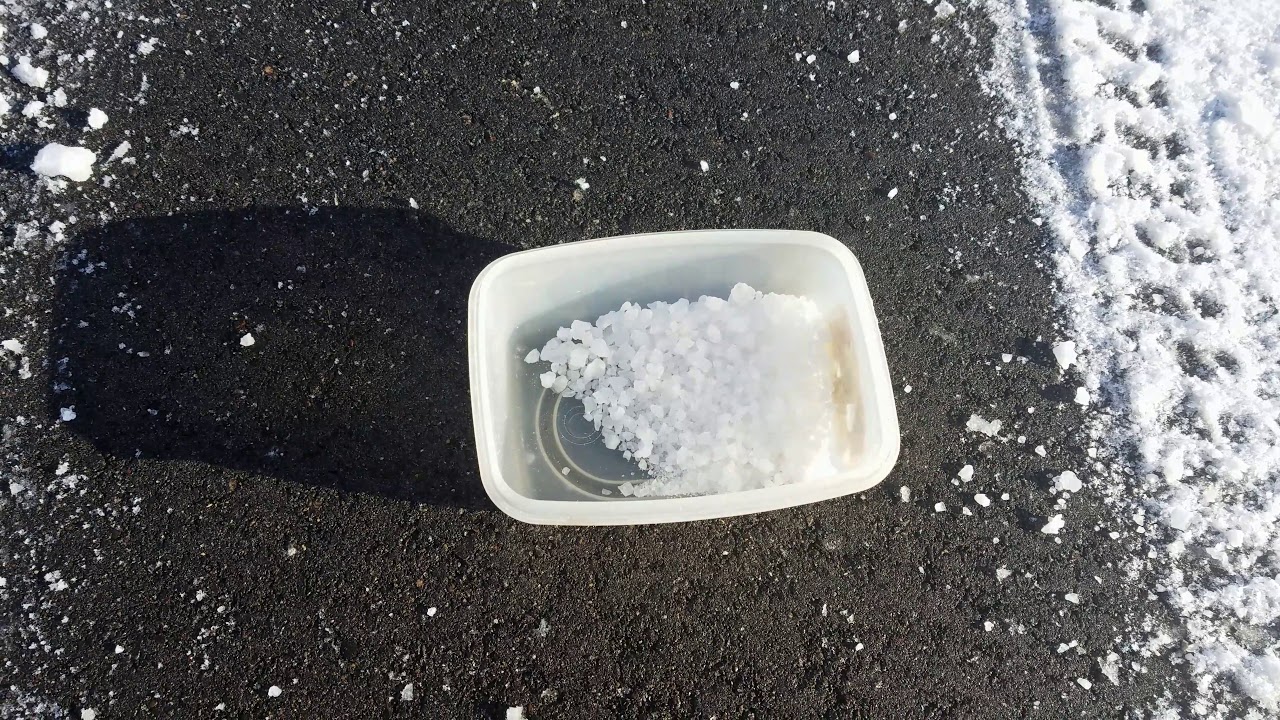As the winter season approaches, many people are stocking up on salt to help melt ice on their sidewalks and driveways. Solar salt is a type of salt that is made from evaporated seawater. It is often used in water treatment and desalination plants.
Solar salt can also be used to melt ice. It is less corrosive than other types of salt and is less likely to harm concrete or plants.
If you live in a cold climate, you know that ice and snow can be a problem. Solar salt can be used to melt ice and keep your sidewalks and driveways clear. Solar salt is a safe and environmentally friendly way to melt ice.
It is also a cost effective way to keep your sidewalks and driveways clear.
How Does Salt Melt Ice?
Can I Use Solar Salt on My Driveway?
If you’re considering using solar salt on your driveway, there are a few things you should know. Solar salt is a type of de-icing salt that is made from evaporated seawater. It’s unique because it’s less corrosive than other types of salt, making it a popular choice for use on metal surfaces.
Solar salt can be effective at melting ice and snow, but it’s important to use it properly. Applying too much salt can damage your driveway, so it’s important to follow the manufacturer’s instructions. You should also be aware that solar salt can be harmful to plants and animals, so take care when using it around your home.
Overall, solar salt can be a good choice for melting ice and snow on your driveway. Just be sure to use it properly and take care around plants and animals.
Can I Use Water Softener Salt to Melt Snow And Ice?
Salt is an effective way to melt ice and snow, but you should not use water softener salt. Water softener salt is not as effective as road salt and can damage your concrete or asphalt.
Which Salt is Best for Melting Ice?
There are many types of salt that can be used to melt ice, but not all of them are created equal. Here is a rundown of the most popular types of salt and how they can be used to melt ice:
1. Rock Salt: Rock salt is the most common type of salt used to melt ice.
It is inexpensive and effective at lower temperatures, but can be dangerous to pets and plants.
2. Calcium Chloride: Calcium chloride is a more expensive option, but it is much more effective than rock salt. It can be used at lower temperatures and is safe for pets and plants.
3. Magnesium Chloride: Magnesium chloride is another effective option, but is more expensive than calcium chloride. It can be used at lower temperatures and is safe for pets and plants.
4. Sodium Chloride: Sodium chloride is the most common type of salt used in melting ice.
It is inexpensive and effective, but can be dangerous to pets and plants.
5. Potassium Chloride: Potassium chloride is another effective option, but is more expensive than sodium chloride. It can be used at lower temperatures and is safe for pets and plants.
Will Pool Salt Work for Melting Ice?
Salt is effective at lowering the freezing point of water, which is why it’s used to melt ice on roads and sidewalks. However, salt will only work if the temperature is above 20 degrees Fahrenheit. If the temperature is below that, the salt will not be effective at melting the ice.

Credit: compoundingpennies.com
Water Softener Salt on Concrete
If your home has hard water, you may have considered installing a water softener. But did you know that the salt used in water softeners can actually damage your concrete?
Concrete is a very porous material, and when it comes into contact with salt, it can absorb it.
This can lead to problems like efflorescence (white powdery deposits on the surface of the concrete) and spalling (flaking and chipping of the concrete).
If you’re considering a water softener, be sure to talk to a professional about the best way to protect your concrete. In some cases, a special concrete sealer may be needed.
And always be sure to sweep up any salt that falls on your concrete, to prevent damage.
Is Water Softener Salt the Same As Rock Salt
Water softener salt is not the same as rock salt. Water softener salt is made of sodium chloride, while rock salt is made of halite. Both products can be used to soften water, but water softener salt is more effective and less expensive.
Can You Use Water Softener Salt to Melt Ice on Driveway
If you live in an area with hard water, you know that it can be a pain to deal with. Not only does it leave spots on your dishes and glasses, but it can also make your hair feel dry and brittle. And if you have a water softener, you know that it uses salt to help remove the minerals that cause hard water.
So, can you use water softener salt to melt ice on your driveway?
The short answer is yes, you can use water softener salt to melt ice on your driveway. In fact, it can be a great way to get rid of ice without having to use harsh chemicals.
The reason water softener salt works to melt ice is because it lowers the freezing point of water. That means that when you spread salt on the ice, it will start to melt.
Of course, you don’t want to use too much salt, as it can damage your driveway.
A good rule of thumb is to use about 1 pound of salt for every 10 square feet of ice.
One other thing to keep in mind is that water softener salt can be more expensive than other types of salt, so you may want to use it sparingly.
In the end, using water softener salt to melt ice on your driveway is a great way to get rid of ice without having to use harsh chemicals.
Just be sure to use it sparingly and you should be good to go!
Conclusion
The blog post discusses the possibility of using solar salt to melt ice. Solar salt is a type of salt that is used to absorb sunlight and convert it into heat. This heat can then be used to melt ice.
The author argues that solar salt could be a more environmentally friendly and less expensive way to melt ice than traditional methods.
